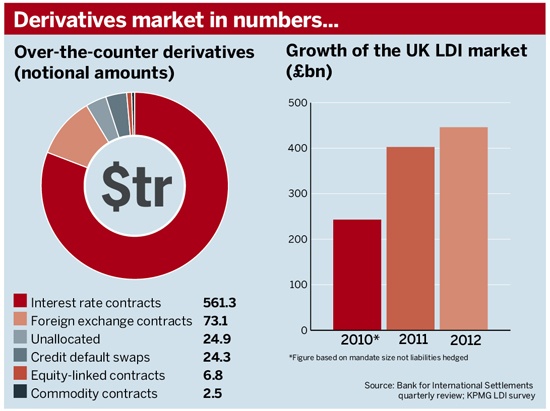Derivatives regulation leaves schemes liable for manager reporting
News analysis: Trustees could be found liable for their investment managers not reporting derivative trades under extended derivatives regulation, with legal experts recommending reviewing contracts to hard-code duties.
Schemes have shown increased appetite for derivative strategies over the past few years, as consultancy KPMG’s 2013 survey of the liability-driven investment market reflected (see graph). The survey also reported increased usage of equity option strategies in 2012.
Under the European Market Infrastructure Regulation’s reporting guidelines, which came into effect on February 12 2014, schemes now have an obligation to report the creation, change or termination of a derivative contract to a central repository the day after it takes place.
However, due to the nature of these contracts, schemes may not know when these changes happen and will have to outsource this function to their investment manager or a third-party delegation service.
Trustees are being warned to review investment management contracts to add ‘side letters’ to clarify reporting duties and investigate whether managers have the scope to use derivatives in their mandates.
Faye Jarvis, of counsel at law firm Hogan Lovells, said trustees will not have the capability to report the trade themselves, but as they are the counterparty to the contract they hold the ultimate legal responsibility for reporting the trade.
“[Schemes] will need to ensure that the investment manager, or whoever is carrying out the trade on their behalf, is reporting these trades,” she said.
Some trustees have, or are looking to, negotiate additions to their investment management contracts to make it clear the managers should be doing the reporting.
“[However] a lot of the investment managers have said, ‘Fine, we’ll do it but you’re ultimately responsible, and we aren’t accepting any liability in relation to the reporting’,” said Jarvis.
Richard Batchelor, principal associate at law firm Eversheds, said this is the first time pension schemes will be under the supervision and enforcement of the Financial Conduct Authority.
Industry experts have said it is believed the FCA will take a soft approach as the reporting guidelines for the regulation bed in.
Due to the volume people in the market, trade repositories have been backed up. “There is a blockage in the system, and the regulator is aware of that,” Batchelor said.
A spokesperson for the FCA said it will take a pragmatic approach, adding: “Our response to the implementation of EMIR will be proportionate and risk-based.”
How schemes can prepare
Most fund managers have stepped up to offer reporting services alongside mandates but, while some have said it is free, others are charging an additional fee, said Simeon Willis, principal consultant at KPMG.
Some schemes will have to go to a third party which will be an additional charge, he added. “The reporting requirement is the most disruptive for trustees,” Willis said.
Schemes should be contacting managers to see if the portfolio contains derivatives, Eversheds’ Batchelor said, adding it needs to be identified whether the manager has discretion to use the product.
Trustees may also look to update their internal risk-registers and governance processes. “It is possible that the FCA could contact them and ask them to provide evidence they have been complying with the EMIR regulation,” Batchelor said.
Due to a reporting backlog schemes could allow time before reviewing managers. “In four to six months, [schemes] should go back to the manager to see if everything is in place… that they are reporting within the timescale,” he said.
Schemes may want to introduce some sort of confirmation that the reports are being made, said Jarvis. If it found managers are making reports late, schemes may look to switch investment managers.
Most Viewed
- What does Labour have in store for the pensions industry?
- ‘We need a consensus’: Sir Stephen Timms calls for higher contributions
- Border to Coast launches UK strategy in major private markets push
- Five themes at the forefront of a sustainable future
- How the pensions industry can better support people with mental health problems


